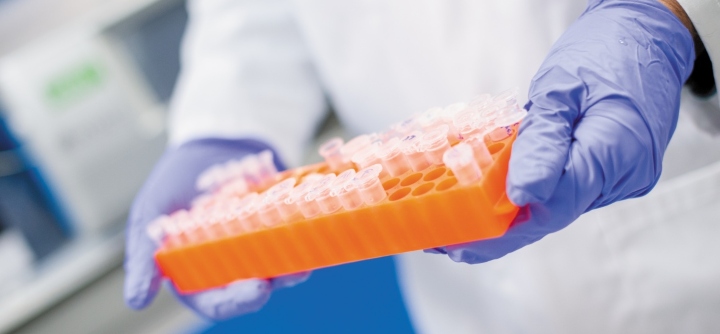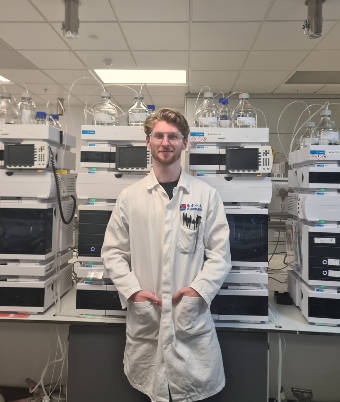Pharmaceutical Sciences

The pharmaceutical sciences courses prepare you for a variety of different graduate careers in the pharmaceutical and biotechnology industry and beyond. Possible careers include:
- Being involved in early-stage drug discovery and formulation development
- Contributing to clinical trials and the approval of medicinal products by regulatory bodies in the UK, USA, Europe, Japan, and other areas
- Taking part in the quality control and manufacture of medicines
- Having responsibility for the analysis of the effectiveness of approved medicines and marketing of pharmaceutical products
Some of these roles, such as early-stage drug discovery and formulation development are laboratory-based. It is not unusual, however, that, you will spend less time in the labs as you progress in your career.
Other roles, such as those involved in the management of clinical trials, regulatory, and marketing are office-based. The common theme in all roles mentioned above is your knowledge of pharmaceutical processes and relevant subject knowledge.
For information about being a pharmacist, please see our page
Find out more on our pharmaceutical career paths page
What skills will I develop?
In addition to your subject knowledge, the degree equips you with key employability skills such as
- critical analysis
- problem-solving and analytical skills
- communication skills – both written and spoken via presentations and written reports
- time management and organisational abilities
- interpersonal skills developed through group work projects
How can I build my skills and experience?
Employers often seek a range of transferable skills, such as communication, problem-solving, and teamwork, in addition to the subject-specific skills and knowledge you will gain during your degree. Below are some ideas of how to develop these transferable skills during your degree; make sure you look at the ‘What can I do?’ pages for even more ideas.
Work experience and volunteering
Depending on what area of work or role you might be interested in, and where, there will be specific strategies, from speculative applications to formal processes you need to be familiar with.
Work experience - what, how and when
Research opportunities in the School of Pharmacy
Research internship opportunities are advertised throughout the year in the School of Pharmacy.
Announcements about opportunities are usually made through Moodle and emails, and/or speak to your personal tutor.
Nottingham Internship Scheme
We work closely with a huge variety of local and national businesses to bring you an exciting range of internship opportunities, for both current students and recent graduates.
Nottingham Consultancy Challenge
The Nottingham Consultancy Challenge offers the chance for you to gain hands-on experience of managing a short term project for a local business or charity as part of a multi-disciplinary team.
Nottingham Advantage Award
Through the completion of extracurricular modules, the Nottingham Advantage Award helps you develop key life and work-based skills and reflect on your experiences, allowing you to demonstrate your achievements and skills more effectively when applying for jobs.
Students' Union
The Students’ Union offers a wide range of volunteering options both locally and internationally which you can fit around your studies.
Alternatively you could get involved in a society or sports club - there's so many, you're bound to find one that interests you!
Optional placement year
You can now undertake an optional placement year as part of your degree at the end of your penultimate year of study. The placement can be aligned to your degree discipline or related to your career aspirations. Speak to a career adviser or your school for more information.
If you are no longer at Nottingham, you can access work and volunteering opportunities at home. Depending on your location and what you want to do, your strategy may vary so come and speak to us or arrange a telephone appointment.
Study Abroad
The majority of University of Nottingham students have the opportunity to study abroad during their university career.
Nottingham has 200 partners in 40 different countries across four different exchange programmes. These include Inter-campus exchange, University-wide exchange, Summer Schools and school exchanges.
Applications usually take place during the autumn semester of the academic year before you would go on exchange.
Apply for part-time jobs
The university advertises advertise part-time, casual and temporary jobs on campus and with local businesses.
Created just for you, the advertised vacancies can fit around your studies and other commitments.
Please be aware that study abroad, compulsory year abroad, optional placements/internships and integrated year in industry opportunities may change at any time for a number of reasons, including curriculum developments, changes to arrangements with partner universities or placement/industry hosts, travel restrictions or other circumstances outside of the university's control. Every effort will be made to update this information as quickly as possible should a change occur.
What are the range of careers I can enter?
Within drug discovery and medicines development, examples include:
- research and development (R&D) analytical chemist
- synthetic organic chemist
- scientist (discovery sciences or R&D oncology or early respiratory and immunology)
- associate formulation scientist
- pharmaceutical development Scientist
Within clinical trials, examples include:
- clinical development manager
- associate clinical data manager (vacancies)
- associate clinical data manager
Within approval and registration, examples include:
- regulatory executive
- regulatory strategist
Within manufacturing, example include
- biopharmaceuticals process R&D
- scale-up and process development associate
- process technologist
Within sales and marketing, examples include:
- international medical affairs
- clinical affairs associate (oncology)
- Europe, Middle East and Africa (EMEA) marketing associate (gastroenterology and immunology)
Also check out our pharmaceutical careers webpage
What do graduates from my course go on to do?
Graduate Outcomes is a national survey capturing the activities and perspectives of graduates launched in 2018 and is the biggest annual social survey in the UK.
You can view the destinations of graduates, who completed the survey, from your course by booking an appointment with an adviser. This can help you to explore your options if you are unsure what you want to do.
Find out more about the Graduate Outcomes survey
Michael Sheehy

Analytical chemistry underpins virtually all practical work in the pharmaceutical R&D sector. Techniques such as HPLC, NMR, FT-IR, XRPD, UV/vis are employed in every lab.
However it is the analytical chemist's job to refine and further develop these analyses.
Our questions to Michael
Read Michael's answers to our three questions:
How did you become an analytical chemist and what does it involve?
What skills did you learn on your degree that are relevant to your role?
What advice do you have for students wanting to work in your sector?
What are my further study options? Watch our webinar on Phd study
This depend on your study interests and/or career ideas. Some examples include:
- MSc Drug Discover
- MSc Drug Discovery with Industrial Training (two-year)
- MSc Oncology
Thinking about a PhD? How to get started and how to apply
In these two videos, Dr Judith Wayte from the University of Nottingham provides clear and wide-ranging advice on:
- how to get started: what to take into account, and how to gather relevant information
- on the application process and how to prepare for interviews
Login to SharePoint to watch the webinar
- Alumni: Email us to gain access to the webinar
Which local companies are involved in this career area?
Where can I look for graduate vacancies?